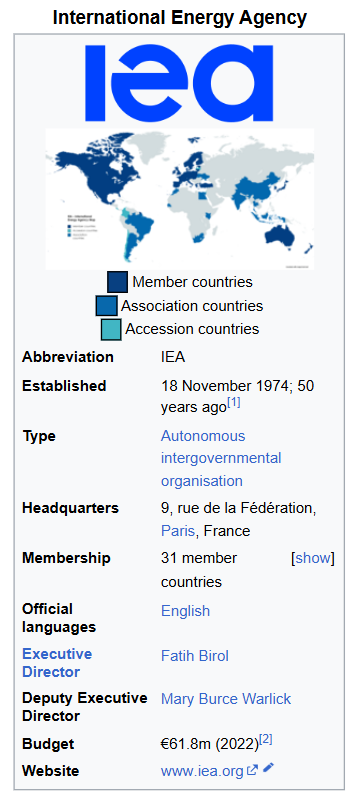While I agree with Wright that the IEA is probably ‘unrealistically green,’ most member countries are OK with the activities of the agency. I criticized its forecast that oil demand had peaked, although the length of the peak may last a long time, and there is little chance of oil demand dropping anytime soon. I also criticized IEA’s overly bullish forecasts for hydrogen development, which I believe are way off the mark. Once again, the U.S. under Trump is being the ‘odd man out’ by threatening to abandon its participation unless the agency is reformed. I do understand Wright’s concern since I have been annoyed by longtime IEA chief Fatih Birol’s calls to transition away from fossil fuels faster than is reasonable.
According to Wikipedia:
“The core activity of the IEA is providing policy advice
to its member states and Associated countries to support their energy security
and advance their transition to clean energy. Recently, it has focused in
particular on supporting global efforts to accelerate clean energy transition,
mitigate climate change, reach net zero emissions, and prevent global
temperatures from rising above 1.5 °C. All IEA member countries have signed the
Paris Agreement {U.S. is back out} which aims to limit warming to 1.5 °C, and
two thirds of IEA member governments have made commitments to emission
neutrality by 2050.”
Wright said that he had been
in contact with Fatih Birol and that he would prefer that IEA reforms,
presumably to give more credence to the world’s dependence on fossil fuels.
“We will do one of two things: we will reform the way
the IEA operates or we will withdraw,” Energy Secretary Chris Wright said
during an interview Tuesday. “My strong preference is to reform it.”
The IEA’s forecast that oil demand will peak this decade is
“just total nonsense,” he noted.
According to Bloomberg:
“Senator John Barrasso, a Wyoming Republican, who said
{last year} the IEA has become an “energy transition cheerleader” and that its
modeling of long-term energy demand was skewed and “no longer provides
policymakers with balanced assessments of energy and climate proposals.”
Most of the criticism of the
IEA in the past was the reverse, that the agency was underestimating the
development of renewables. I do not think the U.S. should have more influence
in the agency than other countries. Thus, I think that any reform efforts
should be approved by a majority of those countries. I don’t think the U.S.
should be able to mold the IEA to its will. It is probably being too pushy to
demand reform, 'or else.’
OPEC has strongly criticized
IEA forecasts for oil demand as dangerous, saying that they expect demand to
keep rising to 2050 from 105 million barrels per day today to 123 million
barrels per day in 2050. In contrast, the IEA forecasted that oil demand will
begin to decline around 2030.
In June 2025, the agency
doubled down on its predictions for oil demand to peak. In its 2025 report, the
agency stated that China’s demand was a big factor in its predictions.
“While China – the world’s top crude oil importer –
accounted for 60% of the global increase in oil consumption in 2015-2024, “the
picture to 2030 looks very different,” the IEA said.
“China’s demand is on track to peak in 2027 – two years earlier than previously thought – amid “an extraordinary surge in EV sales, the continued deployment of trucks running on liquefied natural gas (LNG), as well as strong growth in the country’s high-speed rail network, along with structural shifts in its economy.”
References:
International
Energy Agency. Wikipedia. International
Energy Agency - Wikipedia
US
Threatens to Abandon IEA Over Green-Leaning Energy Forecasts. Ari Natter.
Bloomberg. July 15, 2025. US
Threatens to Abandon IEA Over Green-Leaning Energy Forecasts
U.S.
Vows to Quit IEA if the Agency Keeps Pushing Green Transition. Charles Kennedy.
Oilprice.com. July 16, 2025. U.S.
Vows to Quit IEA if the Agency Keeps Pushing Green Transition | OilPrice.com
IEA
Doubles Down On Peak Oil Demand Forecast. Michael Kern. Oilprice.com. June 17,
2025. IEA
Doubles Down On Peak Oil Demand Forecast | OilPrice.com


No comments:
Post a Comment